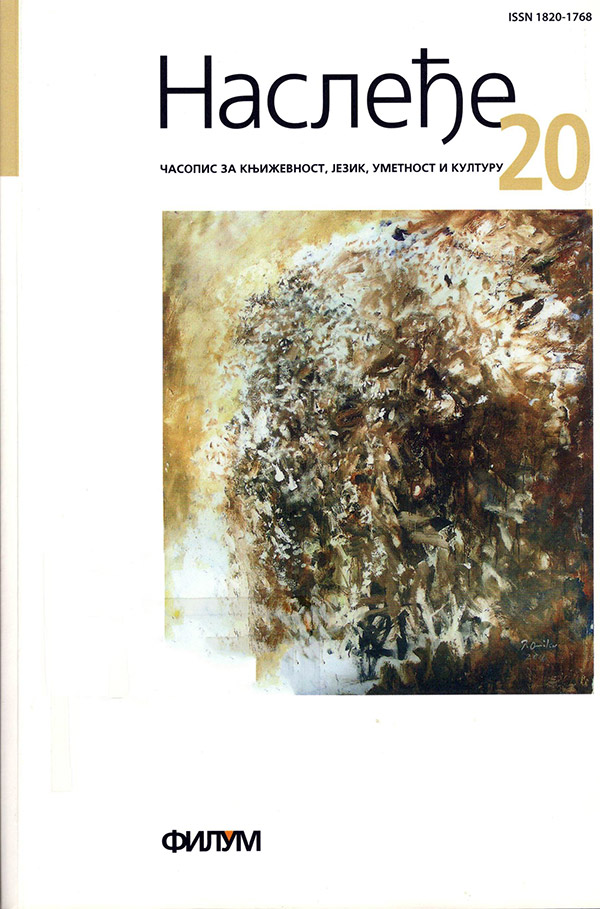THE ENGLISH SUFFIX -ЕR: DERIVATIVES, COMPOUNDS AND ТHEIR АCQUISITION IN SERBIAN EFL LEARNERS
Keywords:
affixes, derivatives, compounds, English, SerbianAbstract
The suffix -er is one of the most productive affixes in present-day English, appearing in derivatives, compounds and syntactic phrases, that is, both morphologically simple and complex words. It encompasses a variety of meanings, such as agent, instrument, clothing, activity, to name but a few. Accordingly, -er formations differ in transparency/vagueness of meaning so the aim of this paper was not only to illustrate some of the characteristics of structure and meaning of words containing the suffix -er, but also to explore their intelligibility in advanced Serbian EFL learners and shed light on the meanings which they commonly attribute to -er formations. Given that the suffix -er also exists in Serbian, mainly denoting agents, and that L1 affects the acquisition of L2, one could expect of the learners to achieve the best results precisely on these test items, but that proved not to be the case as the most prevalent answers were those related to the instrumental meaning of the suffix -er, not the agential one, and the highest scores were also gained for items denoting instruments not agents.
References
Бабић 2002: S. Babić, Tvorba riječi u hrvatskome književnome jeziku, Zagreb: Nakladni zavod Globus, Hrvatska akademija znanosti i umetnosti.
Бауер 1983: L. Bauer, English Word-formation, Cambridge: Cambridge University Press.
Бауер 1988: L. Bauer, Introducing linguistic morphology, Washington D.C.: Georgetown University Press.
Бугарски 1995: R. Bugarski, Uvod u opštu lingvistiku, Beograd: Čigoja štampa.
Васић, Прћић, Нејгебауер 2001: V. Vasić, Т. Prćić, G. Nejgebauer, Du yu speak anglosrpski? Rečnik novijih anglicizama, Novi Sad: Zmaj.
Вилијамс 1981: Е. Williams, Argument structure and morphology, Linguistic Review 1: 81–114.
Вујић 2006: Ј. Vujić, Osnovi morfologije engleskog jezika, Kragujevac: Filološko-umetnički fakultet.
Димитријевић, Даниловић 2011: M. Димитријевић, Ј. Даниловић, The suffix -er in present-day word formations in English: structure, meaning and intelligibility. Рад изложен на скупу The Third Symposium Language Education Today: Between Theory and Practice, Универзитет у Темишвару, Румунија, 6–7. 5. 2011.
Дреслер 2006: W. Dressler, Compound types, у: G. Libben, G. Jarema (уред.), The Representation and Processing of Compound Words, Oxford: Oxford University Press, 23–44.
Даунинг 1977: P. Downing, On the creation and use of English compound nouns, Language 53: 810–842.
Јовановић 2009: Н. Јовановић, The acquisition of compounds in primary school, необјављени мастер рад, Београд: Филолошки факултет. Јесперсен 1942: O. Jespersen, A modern English grammar on historical principles (Vol. VI: Morphology), London: Allen and Unwin.
Капел 2003: B. Cappelle, Meervoudig -er bij Engelse partikelwerkwoorden [Multiple -er on English particle verbs]. Рад изложен на скупу Morfologiedagen 2003, Универзитет у Генту, Белгија, 4–5. 12. 2003.
Капел 2010: B. Cappelle, Doubler-upper nouns: A challenge for usage-based models of language? у: A. Onysko, S. Michel (уред.), Cognitive Perspectives on Word Formation, Mouton: de Gruyter, 337–374.
Кастовски 1971: D. Kastovsky, The Old English suffix -er(e), Anglia 89: 285–325.
Кастовски 1992: D. Kastovsky, Semantics and vocabulary, у: R. E. Hagg (уред.), The Cambridge history of the English language (Vol. I), Cambridge: Cambridge University Press, 290–297.
Катамба 1994: F. Katamba, English words: structure, history, usage, Abingdon: Routledge.
Клајн 2003: И. Клајн, Творба речи у савременом српском језику 2, Београд: Завод за уџбенике и наставна средства.
Кларк, Хешт 1982: E. V. Clark, B. F. Hecht, Learning to coin agent and instrument nouns, Cognition 12: 1–24.
Кларк и др. 1985: E. V. Clark et al., Compound nouns and category structure in young children, Child Development 56: 84–94.
Кларк и др. 1986: E. V. Clark, et al., Coining complex compounds in English: Affixes and word order in acquisition, Linguistics 24: 7–29.
Кларк, Барон 1988: E. V. Clark, B. J. S. Barron, A thrower button or a button thrower? Children’s judgments of grammatical and ungrammatical compound nouns, Linguistics 26: 3–19.
Кларк, Берман 1984: E. V. Clаrk, R. A. Berman, Structure and use in the acquisition of word formation, Language 60: 542–590.
Кларк, Берман 1987: E. V. Clark, R. A. Berman, Types of linguistic knowledge: Interpreting and producing compound nouns, Journal of Child Language 14: 547–67.
Либен 2006: G. Libben Why Study Compound Processing? An overview of the issues, у: G. Libben, G. Jarema (уред.), The Representation and Processing of Compound Words, Oxford: Oxford University Press, 1–22.
Јун 1974: М. Ljung, A frequency dictionary of English morphemes, Stockholm: AWE/Gebers.
Матиjело 2005: E. Mattiello, The Pervasiveness of Slang in Standard and Non-Standard English, Mots Palabras Words 6: 7–41. <http://www.ledonline.it/mpw/allegati/mpw0506mattiello.pdf>. 29. 7. 2011.
Merriam Webster Online. <http://www.merriam-webster.com/dictionary/fixer-upper>. 15. 2. 2011.
Николадис 2006: Е. Nicoladis, Pre-school children’s acquisition of compounds, у: G. Libben, G. Jarema (уред.), The Representation and Processing of Compound Words, Oxford: Oxford University Press, 96–124.
Oxford Dictionaries Online. <http://english.oxforddictionaries.com>. 15. 2. 2011.
Плаг 2003: I. Plag, English Word-formation, Cambridge: Cambridge University Press.
Станојчић, Поповић 21992: Ж. Станојчић, Љ. Поповић, Граматика српскога језика, Београд: Завод за уџбенике и наставна средства/Нови Сад: Завод за издавање уџбеника.
Рајдер 1999: М. Е. Ryder, Bankers and blue-chippers: an account of -er formations in Present-Day English, English Language and Linguistics 3(2): 269–297.
Сузуки и др. 2009: W. Suzuki et al., The effect of output processing on subsequent input processing, Working Papers in TESOL & Applied Linguistics, 9(1): 1–17. <http://journals.tc-library.org/index.php/tesol/issue/view/26>. 10. 3. 2011.
Торн 1990: T. Thorne, The Dictionary of Contemporary Slang, New York: Pantheon Books.
Cambridge Dictionary Online. <http://dictionary.cambridge.org>. 15. 2. 2011. Ћорић 2008: Б. Ћорић, Творба именица у српском језику, Београд: Чигоја штампа.
Хјуз 1989: А. Hughes, Testing for Language Teachers, Cambridge: Cambridge University Press.
Шипка 2006: D. Šipka, Osnovi leksikologije i srodnih disciplina, Novi Sad: Matica srpska.






